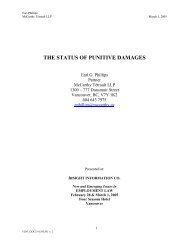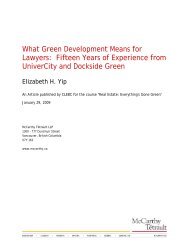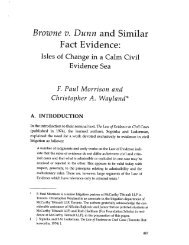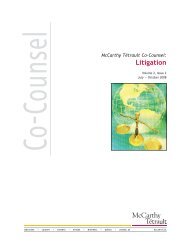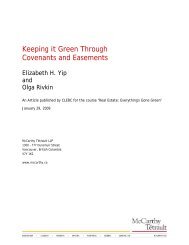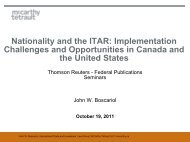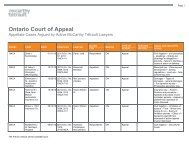The Doctrine of Public Policy in Canadian Contract Law
The Doctrine of Public Policy in Canadian Contract Law
The Doctrine of Public Policy in Canadian Contract Law
You also want an ePaper? Increase the reach of your titles
YUMPU automatically turns print PDFs into web optimized ePapers that Google loves.
22 / Annual Review <strong>of</strong> Civil Litigation<br />
<strong>The</strong> general rule has historically been that no contract may prevent a party from<br />
hav<strong>in</strong>g recourse to the courts with respect to an error <strong>of</strong> law,'0`i and there is a<br />
clear analogy here to the pr<strong>in</strong>ciple <strong>of</strong> constitutional law which prohibits the<br />
legislature from absolutely foreclos<strong>in</strong>g the judicial review <strong>of</strong> decisions reached<br />
by adm<strong>in</strong>istrative tribunals.1"9 Despite the forego<strong>in</strong>g proposition, Federal and<br />
prov<strong>in</strong>cial arbitration legislation now enables parties to submit disputes regard<strong>in</strong>g<br />
many questions <strong>of</strong> fact or law to the exclusive jurisdiction <strong>of</strong> an arbitrator.<br />
Additionally, even prior to this legislation, the courts had held that a contract<br />
may make arbitration on a question <strong>of</strong> fact or law a condition precedent to<br />
litigation,' ip and may state that any rul<strong>in</strong>gs <strong>of</strong> fact arrived at by the arbitrator or<br />
tribunal <strong>in</strong> question are to be f<strong>in</strong>al."' Similarly, parties may agree to confer<br />
upon one another certa<strong>in</strong> remedial rights (such as a creditor tak<strong>in</strong>g <strong>in</strong>to possession<br />
the property <strong>of</strong> a debtor) without the necessity <strong>of</strong> first obta<strong>in</strong><strong>in</strong>g judicial<br />
authorization.' 2 In light <strong>of</strong> the legislative developments noted above, and the<br />
current emphasis upon <strong>in</strong>creas<strong>in</strong>g access to justice, the courts also appear to be<br />
para. 19; Potash v. Royal Trust Co. , [1986] 2 S.C.R. 351, [1986] S.C.J. No. 58 at paras.<br />
39-41; and N.A.P.E. v. Newfoundland (Green Bay Health Care Centre),[1996] 2 S.C.R.<br />
3, [1996] S.C.J. No. 54 at paras. 15-26. In Syndicat des employes de l'Hopital general<br />
de Montreal c. Sexton, (sub nom. McGill University Health Centre (Montreal General<br />
Hospital) v. Syndicat des employes de l'Hopital general de Montreal) 2007 SCC 4 at<br />
para. 21, the pr<strong>in</strong>ciple was summarized as consist<strong>in</strong>g <strong>in</strong> the proposition that: "the parties<br />
to a contract cannot agree to limit a person's fundamental rights" (although, curiously,<br />
the degree to which parties may limit rights aris<strong>in</strong>g under the Charter would appear to<br />
rema<strong>in</strong> an open question: Syndicat Northcrest v. Amselem, 2004 SCC 47 at para. 92).<br />
An <strong>in</strong>terest<strong>in</strong>g manifestation <strong>of</strong> this pr<strong>in</strong>ciple may be observed where parties seek to<br />
oust the application <strong>of</strong> a given statutory regime through govern<strong>in</strong>g or "choice <strong>of</strong> law"<br />
provisions: see United Nations v. Atlantic Seaways Corp., [1979] 2 F.C. 541, 1979<br />
CarswellNat 62 (C.A.) at para. 27, stat<strong>in</strong>g that "the proper law must not have been chosen<br />
to evade a mandatory provision <strong>of</strong> the law with which the contract has its closest and<br />
most real connection." <strong>The</strong>se types <strong>of</strong> agreements are discussed <strong>in</strong> William Tetley,<br />
"Evasion/Fraude a la loi and Avoidance <strong>of</strong> the <strong>Law</strong>" (1994) 39 McGill L.J. 303.<br />
108 Thompson v. Charnock (1799), 8 T.R. 139. See also Jack Bradley (Maritimes) Ltd. v.<br />
Modern Construction Ltd. (1966), 59 D.L.R. (2d) 519 (N.B. C.A.) at 524; and-Enderby<br />
Town Football Club v. Football Assn. Ltd. (1970), [1971] Ch. 591 (Eng. C.A.) at 607.<br />
109 See Crevier v. Quebec (Attorney General), [1981] 2 S.C.R. 220.<br />
110 <strong>The</strong> locus classicus <strong>of</strong> this pr<strong>in</strong>ciple is Scott v. Avery (1855), 5 H.L.C. 811 (U.K. H.L.).<br />
See also Burns & Roe <strong>of</strong> Canada Ltd. v. Deuterium <strong>of</strong> Canada Ltd. (1974), (sub nom.<br />
Deuterium <strong>of</strong> Canada Ltd. v. Burns & Roe <strong>of</strong> Canada Ltd.) [1975] 2 S.C.R. 124.<br />
11 1 Baker v. Jones,[1954] 1 W.L.R. 1005 (Q.B.D.). This po<strong>in</strong>t was qualified <strong>in</strong> Nikko Hotels<br />
(U.K.) Ltd. v. M.E.P. C. plc, [1991] 2 E.G.L.R. 103 (Ch. D.), such that a contract cannot<br />
prevent a party from mak<strong>in</strong>g an application to a court with respect to a matter <strong>of</strong> fact<br />
where the decision <strong>of</strong> the arbitrator <strong>in</strong> relation to it issued from an analysis <strong>of</strong> the wrong<br />
question.<br />
112 Banque nationale du Canada v. Atomic Slipper Co.,[1991] 1 S.C.R. 1059, [1991] S.C.J.<br />
No. 38, reconsideration refused at para. 46 [QL].




